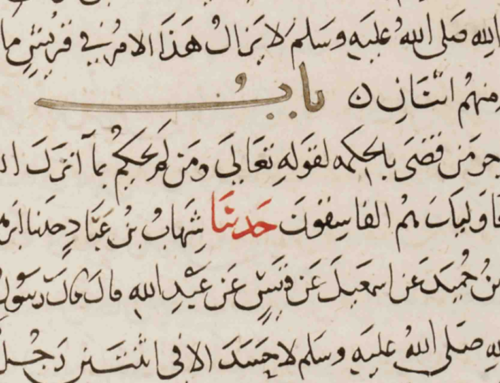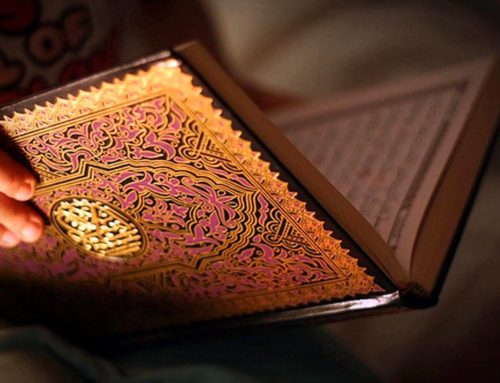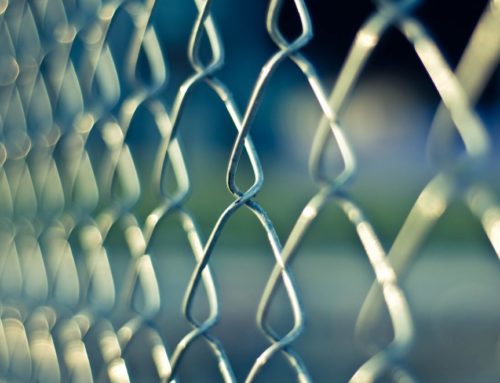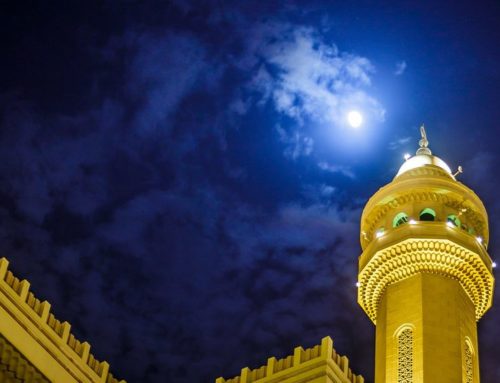Translated by Ismaeel Nakhuda
Translator — The article below was published in Roshni, a religious supplement published each Friday with the Saudi-based Urdu News newspaper, in clarification of a column published a few weeks earlier, discussing a story about a man who was told on his death bed that he had been forgiven due to his devotion to sending Blessings and Peace (Salat wa Salam) to the Prophet (Allah bless him and give him peace) each morning.
The column also included a discussion on how, according to the writer, it is contrary to Islamic doctrine to believe that the Prophet (Allah bless him and give him peace) is alive in his grave and that the Umma’s deeds are presented to him — viewpoints that Shaykh ‘Abd al-Hafiz felt compelled to clarify. The shaykh’s article was published on 4 Jumada ‘l-Ula, 1429 (9 May, 2008). Comments within square brackets are not part of the original article and have been included by the translator for clarity.
Shaykh ‘Abd al-Hafiz writes:
There are a few points to note in Dr Sayyid Sa’id ‘Abidi’s article, Are Our Actions Presented to the Messenger of Allah (Allah bless him and give him peace)?, which appeared on page eight of the Roshni supplement on 27 Rabi’ al-Ula, 1429 (4 April, 2008).
In response to the above question, Dr ‘Abidi considers the story to be contrary to Islamic belief (‘aqida) and therefore makes some serious accusations against the author [of the book in which the story was originally mentioned]. In reality, the purpose of such stories, which the noble ‘ulama often include in their books, is not to explain belief but to encourage readers to diligently carry out actions mentioned within, as, sometimes, they are a means of gaining Allah Most High’s acceptance.
The author’s purpose [in narrating the story] was only to show that the mercy of Allah Most High turns to the writing and recitation of Blessings and Peace (Salat wa Salam) to the Prophet (Allah bless him and give him peace). It is unknown which action will be accepted; because of this one should persistently send Blessings and Peace to him. One should not consider such a deed to be trivial, as a great deal of encouragement to send Blessings and Peace to the Prophet (Allah bless him and give him peace) has been narrated in the blessed hadiths. Hafiz Ibn al-Qayyim and others have mentioned innumerable benefits of this. The purpose of narrating this story is not to explain belief; rather, it is to encourage the sending of Peace and Blessings. It is for this that senior ‘ulama — such as Hafiz Ibn al-Jawzi, Hafiz Ibn al-Qayyim, Hafiz Dhahabi and others — have always included such stories in their writings.
In fact, it has been narrated from the Messenger of Allah (Allah bless him and give him peace) himself that an immoral woman, seeing a thirsty dog at the side of a well, felt sorry and lowered her shoe inside. Having filled it, she gave the dog water to drink. On this, Allah Most High forgave her. It is not Islamic belief that is being explained here that — we seek refuge with Allah — sin as much as you want and then at the end feel sorry for an animal and feed it; you will be forgiven. Rather, Allah Almighty’s generosity and kindness is being explained that if He, who is the kindest of all (Akram al-akramin), wishes then he can even forgive such a sinful woman on such a small action. In other words, one is being encouraged to mercy the creation, something that draws Allah’s mercy.
Regarding the hadith about the deeds of the Umma being presented to the Messenger of Allah (Allah bless him and give him peace), Dr ‘Abidi, in an unbefitting fashion, writes: “Were the actions of the Companions (may Allah be pleased with them) also presented to the Messenger of Allah (Allah bless him and give him peace) when he was alive? So, how and for what reason are they presented after the Messenger of Allah’s (Allah bless him and give him peace) death?” Such boldness and disrespect is totally inapt.
The question of why actions are presented [as mentioned by Dr ‘Abidi in his article] remains. However, the Messenger of Allah has clarified this in that very hadith [1]Translator – In his article, Dr ‘Abidi mentions this hadith from Sunan Nasai on the authority of Sayyiduna ‘Abd Allah ibn Mas’ud (may Allah be pleased with him). : “Whatever good I shall see, I shall praise Allah for that; and whatever bad I shall see, I shall seek repentance on your behalf.” The purpose has been explained by the Prophet of Guidance and Mercy (Allah bless him and give him peace) himself — something at which Dr ‘Abidi and all of us should rejoice. May Allah Most High, through His bounty, accept the Messenger of Allah’s (Allah bless him and give him peace) repentance on our behalf and forgive us all of our sins. Amin.
What remains now is the issue surrounding this hadith, which Dr ‘Abidi has separated into two parts and then individually explained at great length. Regarding this, it suffices to say that senior hadith scholars — those who have an extremely high standing in the subject — have considered it to be authentic (sahih). It is the words of these experts and specialists that will be relied upon and accepted. Personal opinions that run contrary to the views of these masters of hadith will definitely not be deliberated on. This is an accepted principle.
Hafiz ‘Iraqi says the chain of narration (isnad) of this hadith is excellent (jayyid). Imam Hafiz Haythami also mentions the same in Majma’ al-Zawa’id and writes that Imam Qastallani, the commentator of Sahih al-Bukhari, considers it to be authentic (sahih). The great hadith scholar, Mulla ‘Ali al-Qari has also mentioned it to be authentic in Sharh al-Shifa and writes that Imam Jalal al-Din al-Suyuti has mentioned it to be authentic in his books. Imam Munawi has mentioned it to be authentic in Fayd al-Qadir, likewise, Imam Zurqani in Sharh al-Mawahib has considered it to be authentic and so has Imam Shihab al-Khafaji in Sharh al-Shifa.
In addition, the hadith has been narrated mursal [2]Translator – Mursal is that hadith whose chain of narration’s end link has not been mentioned. In other words the Tabi’i (Follower) mentions from the Prophet of Allah (peace and … Continue reading from a different chain of narration — this has been mentioned by Hafiz Isma’il al-Qadi in Juz’ al-Salat ‘ala ‘l-Nabi. Shaykh Nasir al-Din al-Albani writes that it is mursal sahih and Hafiz Ibn ‘Abd al-Hadi al-Hanbali has mentioned it authentic in his book Al-Sarim al-Munki. The great hadith scholar ‘Allama ‘Abd Allah al-Ghumari has also penned a booklet, entitled Nihayat al-Amal fi Sihha wa Sharh Hadith ‘Ard al-‘Amal, solely on this hadith.
Further to this, Hafiz Ibn al-Jawzi — who has been quoted by Dr ‘Abidi, and who is considered to be among those hadith scholars known for their critical research and stringency — has penned a brilliant two-volume book on the Prophet’s life, entitled Al-Wafa bi Ahwal al-Mustafa (Allah bless him and give him peace). In its introduction to the book, Hafiz Ibn al-Jawzi writes that he has only included authentic hadiths and kept it completely clear of lies. Hafiz Ibn al-Jawzi also devotes an individual chapter comprising three hadiths to the subject — Al-Bab al-Sabi’ wa w’l-Arba’un fi ‘Ard ‘Amal Ummatihi ‘Alayh (The Forty-Seventh Chapter Regarding the Presentation of His Umma’s Action to Him).
The first of these hadiths has been narrated by Sayyiduna Aws ibn Aws (may Allah be pleased with him) that the Noble Prophet (Allah bless him and give him peace) said: “The best of your days is Friday. On that day Adam (peace be upon him) was created, on that day he died, on that day the Trumpet will be blown and on that day all of creation will swoon. So send a great deal of blessings upon me, for your blessings will be shown to me.” They said, “Oh Messenger of Allah, how will our blessings upon you be shown to you when you have turned to dust?” He said, “Allah has forbidden the Earth to consume the bodies of the Prophets (peace be upon them).”
The second hadith is the one mentioned by Dr ‘Abidi — not the one from Sayyiduna ‘Abd Allah ibn Mas’ud, but one from Bakr ibn ‘Abd Allah al-Muzani, which is mursal and which Shaykh Albani says is mursal sahih.
The third hadith has been narrated by Sayyiduna Anas ibn Malik (may Allah be pleased with him) that the Messenger of Allah (Allah bless him and give him peace) said: “My life is also good for you in that wahy (revelation) comes to me from the sky and that I can inform you about what is permissible and what is impermissible; and my death is also good for you in that your actions will be presented to me every Friday. So whatever is good, I shall praise Allah for that; and whichever sins I shall see, I shall seek repentance on your behalf.”
In sum, it can be said that the hadiths about the presentation of deeds — including the presentation of Peace and Blessings, as that is also a deed — have been narrated from three individuals: Sayyiduna ‘Abd Allah ibn Mas’ud, Sayyiduna Anas ibn Malik and Bakr ibn ‘Abd Allah al-Muzani.
One of the hadiths regarding “peace and blessings” has been narrated from Sayyiduna Aws ibn Aws and one from Sayyiduna Abu ‘l-Darda’, which, at the end, includes the wording: “Hence the Messenger of Allah is alive and being given his sustenance.” This hadith [contrary to what Dr ‘Abidi writes in his article] has also been considered authentic by Hafiz Mundhiri, ‘Allama Zurqani, Hafiz Ibn Hajar al-‘Asqalani, Mulla ‘Ali al-Qari, Qadi Shawkani and others. Further to this, the noble ‘ulama and great hadith scholars have said the ‘ulama are united (ijma’) that “the Noble Prophet (Allah bless him and give him peace) is alive in his grave and is being given sustenance (rizq).”
Regarding this, Hafiz Ibn al-Qayyim (may Allah mercy him) in his book, Zad al-Ma’ad, writes in detail that: “It is definitely known that the pure body of the Prophet (Allah bless him and give him peace) is completely fresh in his blessed grave. The Companions (may Allah be pleased with them) asked the Prophet (Allah bless him and give him peace) how Peace and Blessings would be presented to him after his death? At this, the Prophet (Allah bless him and give him peace) said that Allah Most High has forbidden the Earth from consuming the bodies of the Messengers. If the Prophet’s pure body was not in the noble grave then he would definitely not have replied as such. Likewise, it has been authentically established from the Prophet that Allah Most High has appointed angels at his noble grave to convey the greetings of his Umma. It is also authentically established that the Prophet (Allah bless him and give him peace) once stood between Sayyiduna Abu Bakr and Sayyiduna ‘Umar and said: ‘We will be raised like this.’
“With all these truths, it is also absolute that the Prophet’s blessed soul is in the Highest Heaven (A’la ‘Illiyyin) at the Rafiq al-A’la together with the souls of the other messengers (peace be upon them). Hence, the soul is there and is in connection with his pure body, which is in his blessed grave. The relationship between the soul and the body is such that the Prophet offers prayer (salat) in his noble grave and responds to the greetings of those who visit him. On the basis of this relationship between the soul and the body, he saw Sayyiduna Musa (peace be upon him) offering prayer standing in his grave.”
In conclusion, there is no room for anyone to reject in anyway that which has been clearly mentioned in the blessed hadiths regarding the life of the Prophet (Allah bless him and give him peace) in the afterlife (barzakh) — this is regardless of whether one can or cannot comprehend the issue. One should supplicate to Allah Most High that He grants us the ability to make our minds and comprehension subject to that which is explicit in the Qur’an and Sunna — this is the straight path. May Allah grant us all steadfastness on it, and bestow us with His proximity by granting us sincerity and piety in all our actions and states. Amin.
| ↑1 | Translator – In his article, Dr ‘Abidi mentions this hadith from Sunan Nasai on the authority of Sayyiduna ‘Abd Allah ibn Mas’ud (may Allah be pleased with him). |
|---|---|
| ↑2 | Translator – Mursal is that hadith whose chain of narration’s end link has not been mentioned. In other words the Tabi’i (Follower) mentions from the Prophet of Allah (peace and blessings upon him) missing out the Companion (Sahabi). (See Mufti Sa’id Ahmad al-Palanpuri’s Tuhfat al-Durar Sharh Nukhbat al-Fikar). |







as-salamu `alaikum
nice article masha’Allah.
Is the author of the above also the author of:
موقف أئمة الحركة السلفية من التصوف والصوفية
If so, any plans to translate any material from there?
Assalam o ‘alaykum,
1. Imam Sayyid Anwar Shah Kashmiri, while discussing the hadith of deeds being presented to Holy Prophet (Allah bless him and give him peace), writes:
ان عرض كعرض الاسمآء على الملا ئكة لا علم محيط
“Certainly, the presentation is like the presenting of the names [asma’] upon the angels. Not all encompassing knowledge (‘ilm-muhit).” (‘Aqidah Islam, p.11)
2. And he writes at another place:
قوله: (فإِذا عيناه تَذْرِفان) وقد مَرّ وَجْه البكاء أنه قال: كيف أشهدُ عليهم ولم أشاهدهم؟ فقيل: إنه تُعْرض الأعمالُ عليك، والعَرْض عِلْم إجمالي.
“His saying [So, when his eyes shed tears]. And it has been mentioned the reason for crying in that he said: ‘How can I be a witness for them when I cannot see them?’ So it was said: ‘Surely, deeds will be presented to you.’ And the presentation is ijmali knowledge [knowledge that is summarized/overall].” (Faydal-Bari sharh al-Bukhari, 6:458)
3. Shaykh Sayyid Ahmad al-Barzanji (may Allah have mercy on him), grand Mufti of Shafi’is in Madina, writes in refutation of batil belief of hadhir nadhir:
“Bakr bin ‘Abd Allah al-Muzani said that the Messenger of Allah (Allah bless him and grant him peace) said, “My life is better for you. You speak and are spoken to. When I die, my death will be better for you. Your deeds will be presented to me. So, if I see good, I shall praise Allah. And if I see anything apart from that, then I shall seek forgiveness for you from Allah.”
He [Imam al-Subki] then mentioned more ahadith after this, all of which prove that the angels present the Salat wa Salam of his Ummah to him (Allah bless him and grant him peace). He then said after this that: Our purpose in writing all these ahadith is to illustrate the [concept of] ‘presenting’ to the Prophet [may Allah bless him and grant him peace] and the meaning of this is the conveying of the angels to the Prophet (Allah bless him and grant him peace)…
Hence, these hadiths that Imam Taj al-Din al-Subki has mentioned tell that the Prophet (May Allah bless him and grant him peace) is only informed of the Salat wa Salam of that person who is away from his noble grave and the deeds of his Ummah after they are conveyed to him by those angels who are entrusted with this [duty].
As a result, if the situation was as Molwi Ahmad Radha Khan has thought is that the knowledge of the Prophet (Allah bless him and grant him peace) is encompassing all of “what was and what shall be” (ma kan wa ma yakun) — detailing minute particulars (juziyyat) and entireties (kuliyyat) — then his knowledge of that would not be dependent on the angels’ conveying [of that knowledge] to him because the inseparable attributes of the above mentioned [claim of] encompassing [knowledge] would be that he (Allah bless him and grant him peace) is knowledgeable that such and such a person is, for example, offering prayers and sending Salutations on him at such a such time, and that such a such a person is doing such a good or bad deed at such a time. If this was the case, then what need would there be for the angels who have been explicitly mentioned in the above mentioned ahadiths.”
(See: Ghayat Al-Ma’mul fi ‘Ilm Ghayb al-Rasul)
assalamualaikum
I would be grateful to you if you provide me with th reference of this hadeeth.
Narrated by Sayyiduna Aws ibn Aws (may Allah be pleased with him) that the Noble Prophet (Allah bless him and give him peace) said: “The best of your days is Friday. On that day Adam (peace be upon him) was created, on that day he died, on that day the Trumpet will be blown and on that day all of creation will swoon. So send a great deal of blessings upon me, for your blessings will be shown to me.” They said, “Oh Messenger of Allah, how will our blessings upon you be shown to you when you have turned to dust?” He said, “Allah has forbidden the Earth to consume the bodies of the Prophets (peace be upon them).”
And also the one which, at the end, includes the wording: “Hence the Messenger of Allah is alive and being given his sustenance.”
fi amanillah 🙂
Assalamu alaikum,
Here are the references:
Hadeeth of Sayyidina Aws – Abu Dawood V1 P405
Hadeeth mentioning ‘alive and being given sustenance’ narrated by Sayyidina Abu Dardaa’ – Ibni Maajah V1 P524.
walaikumussalam.
jazakallah 🙂
It would be great if you provide me the refrences of the following too.
“The second hadith is the one mentioned by Dr ‘Abidi — not the one from Sayyiduna ‘Abd Allah ibn Mas’ud, but one from Bakr ibn ‘Abd Allah al-Muzani, which is mursal and which Shaykh Albani says is mursal sahih”
Where, in the article is the 2nd hadeeth mentioned?
& this one too…
“The third hadith has been narrated by Sayyiduna Anas ibn Malik (may Allah be pleased with him) that the Messenger of Allah (Allah bless him and give him peace) said: “My life is also good for you in that wahy (revelation) comes to me from the sky and that I can inform you about what is permissible and what is impermissible; and my death is also good for you in that your actions will be presented to me every Friday. So whatever is good, I shall praise Allah for that; and whichever sins I shall see, I shall seek repentance on your behalf.”.
I would love to get references of as many as possible ahadeeth you have got/can find about aqeedah Hayat-un-Nabi (s).
Jazakallah again 🙂
Fi amanillah 🙂
Posting for moulana:
Hadeeth of Bakr ibni Abullah Al Muzani – Musnadul Bazzaar V5 P308,
At Tabaqaatul Kubraa Ibni Sa’d V2 P194, Musnadul Haarith V4 P23.
Reference to the Hadeeth of Sayyidina Anas bin Maalik is made in Kanzul Ummaal – V12 P421.
assalamualaikum.
Dear Moulana, I would request you to give the references in “kitab & baab” format as I’m unable to find it in the “volume& page number” format 🙁
jazakallah 🙂
assalamualaikum.Dear Moulana, I would request you to give the references in “kitab & baab” format as I’m unable to find it in the “volume& page number” format :(
jazakallah :)
الطبقات الكبرى (ابن سعد) – (2 / 194)
( ذكر ما قرب لرسول الله صلى الله عليه و سلم من أجله ) أخبرنا يونس بن محمد المؤدب أخبرنا حماد بن زيد عن غالب عن بكر بن عبد الله قال قال رسول الله صلى الله عليه و سلم حياتي خير لكم تحدثون ويحدث لكم فإذا أنا مت كانت وفاتي خيرا لكم تعرض علي أعمالكم فإذا رأيت خيرا حمدت الله وإن رأيت شرا استغفرت الله لكم
مسند الحارث – (4 / 23)
كتاب علامات النبوة باب في حياته ووفاته
– حدثنا الحسن بن قتيبة ، ثنا جسر بن فرقد ، عن بكر بن عبد الله المزني قال : قال رسول الله صلى الله عليه وسلم : « حياتي خير لكم تحدثون ويحدث لكم ، ووفاتي خير لكم تعرض علي أعمالكم ، فما كان من حسن حمدت الله عليه ، وما كان من سيئ استغفرت الله لكم »
سنن أبى داود – (1 / 405)
باب فَضْلِ يَوْمِ الْجُمُعَةِ وَلَيْلَةِ الْجُمُعَةِ.
– حَدَّثَنَا هَارُونُ بْنُ عَبْدِ اللَّهِ حَدَّثَنَا حُسَيْنُ بْنُ عَلِىٍّ عَنْ عَبْدِ الرَّحْمَنِ بْنِ يَزِيدَ بْنِ جَابِرٍ عَنْ أَبِى الأَشْعَثِ الصَّنْعَانِىِّ عَنْ أَوْسِ بْنِ أَوْسٍ قَالَ قَالَ رَسُولُ اللَّهِ -صلى الله عليه وسلم- « إِنَّ مِنْ أَفْضَلِ أَيَّامِكُمْ يَوْمَ الْجُمُعَةِ فِيهِ خُلِقَ آدَمُ وَفِيهِ قُبِضَ وَفِيهِ النَّفْخَةُ وَفِيهِ الصَّعْقَةُ فَأَكْثِرُوا عَلَىَّ مِنَ الصَّلاَةِ فِيهِ فَإِنَّ صَلاَتَكُمْ مَعْرُوضَةٌ عَلَىَّ ». قَالَ قَالُوا يَا رَسُولَ اللَّهِ وَكَيْفَ تُعْرَضُ صَلاَتُنَا عَلَيْكَ وَقَدْ أَرِمْتَ يَقُولُونَ بَلِيتَ. فَقَالَ « إِنَّ اللَّهَ عَزَّ وَجَلَّ حَرَّمَ عَلَى الأَرْضِ أَجْسَادَ الأَنْبِيَاءِ ».
سنن ابن ماجه – (5 / 130)
بَاب ذِكْرِ وَفَاتِهِ وَدَفْنِهِ صَلَّى اللَّهُ عَلَيْهِ وَسَلَّمَ
– حَدَّثَنَا عَمْرُو بْنُ سَوَّادٍ الْمِصْرِيُّ حَدَّثَنَا عَبْدُ اللَّهِ بْنُ وَهْبٍ عَنْ عَمْرِو بْنِ الْحَارِثِ عَنْ سَعِيدِ بْنِ أَبِي هِلَالٍ عَنْ زَيْدِ بْنِ أَيْمَنَ عَنْ عُبَادَةَ بْنِ نُسَيٍّ عَنْ أَبِي الدَّرْدَاءِ قَالَ
قَالَ رَسُولُ اللَّهِ صَلَّى اللَّهُ عَلَيْهِ وَسَلَّمَ أَكْثِرُوا الصَّلَاةَ عَلَيَّ يَوْمَ الْجُمُعَةِ فَإِنَّهُ مَشْهُودٌ تَشْهَدُهُ الْمَلَائِكَةُ وَإِنَّ أَحَدًا لَنْ يُصَلِّيَ عَلَيَّ إِلَّا عُرِضَتْ عَلَيَّ صَلَاتُهُ حَتَّى يَفْرُغَ مِنْهَا قَالَ قُلْتُ وَبَعْدَ الْمَوْتِ قَالَ وَبَعْدَ الْمَوْتِ إِنَّ اللَّهَ حَرَّمَ عَلَى الْأَرْضِ أَنْ تَأْكُلَ أَجْسَادَ الْأَنْبِيَاءِ فَنَبِيُّ اللَّهِ حَيٌّ يُرْزَقُ
Jazakumullahu khairan katheera 🙂